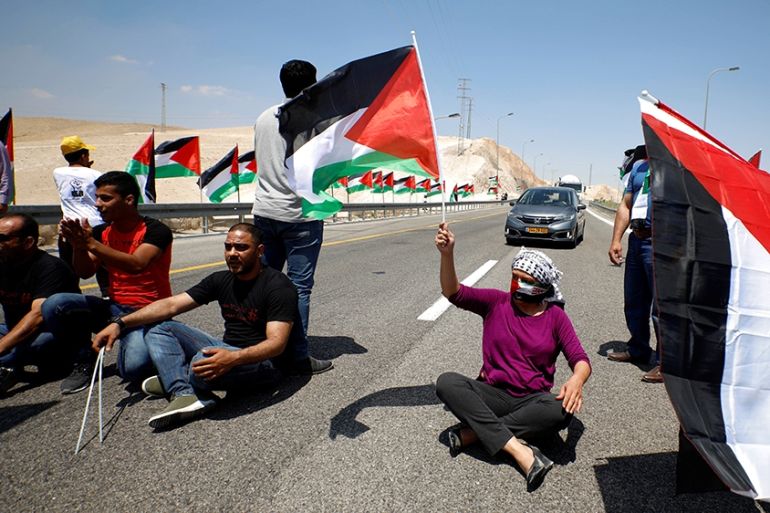Waiting to be bulldozed: Khan al-Ahmar’s residents stuck in limbo
Residents determined to fight after Israeli court rules in favour of demolishing the occupied West Bank village they’ve called home for decades.

Khan al-Ahmar, occupied West Bank – Tucked away behind a motorway, Khan al-Ahmar is almost invisible.
The village, which has been home to Palestinian Bedouins for more than 60 years, doesn’t appear on official maps.
Keep reading
list of 4 itemsPeople killed in Israeli raid in West Bank as US, EU sanction more settlers
Palestinian Prisoner’s Day: How many are still in Israeli detention?
The Take: As missiles fly above, settler violence surges in the West Bank
It’s easy to drive by without noticing it.
But now Khan al-Ahmar has become very visible both locally and internationally – a symbol of what’s happening in the occupied West Bank.
Khan al-Ahmar is in Area C of the occupied West Bank, which is under full Israeli control.
In order to build anything, Palestinians living in the area need a permit rarely issued by Israeli authorities.
In 2009, the Palestinians built a school in Khan al-Ahmar with Italian help. It’s the village’s only “permanent” structure. But this is an overstatement – the school is a ramshackle structure, just like the rest of the village.
As soon as it was erected, right-wing Israelis filed a court case asking for it to be demolished. After years of legal fights, Israel’s High Court ruled last week in favour of demolishing not just the school, but the entire village.
Now, this decades-old village, which was never recognised, will be demolished by Israel.
|
|
Currently, Khan al-Ahmar’s residents are in limbo, not knowing when the bulldozers will come.
Sara Abu Dahuk, 40, is one of them. She sits in her house, made of corrugated iron sheets and rope. It doesn’t look like it could survive a breeze, let alone desert conditions, but it has – until now.
She is uncertain of her future and it sticks in her mind all day long.
“We are just really tired. Life has changed for us,” she says.
“We used to go with our sheep and tend to them, but now we don’t even leave the village unless there’s an emergency. I am concerned about my children. What is their future? My son does not sleep at night, for fear of the Israelis. Whenever I think about the day the Israelis will come, I don’t know how I will cope, or what I should pack.”
Abu Dahuk has a small bag already packed with the family’s documents and other paperwork. Like many others, she doesn’t know what else to pack. It’s difficult to do so when you don’t want to leave your home.
‘The waiting is the most difficult thing’
Not knowing when the bulldozers will come, while knowing that the legal battle has been lost, has had an effect on the mindset of this community.
Nisreen, Abu Dahuk’s 15-year-old daughter, wanted to be a teacher but those plans are now on hold.
“We go to sleep in fear of the Israelis coming. I don’t even know if there will be school in the morning. The waiting is the most difficult thing.”
Despite the uncertainty, the village tries to keep to its routine.
Life here begins with the first morning light, when a man sings the Islamic call to prayer. There is no microphone to carry his voice, just the wind.
A rooster crows and horses and donkeys get up onto their legs, shaking away the sleep from their bodies. But for how long the routine will continue is unknown.
The Israelis have planned for a Jewish settlement, according to a plan known as E1, which has been around since 1994.
E1 seeks to expand the (illegal under international law) Israeli settlement of Maale Adumim. Israeli settlers are encouraged by the government to move to the occupied West Bank.
The settlements have all the services they need – water, gas, internet, and in some cases private roads running through Palestinian land.
In contrast, residents of villages such as Khan al-Ahmar don’t have access to even basic services, are refused building permits, are subject to harassment by settlers and are governed not by civilian rule but by Israeli military rule.
As they wait for the bulldozers, Khan al-Ahmar’s residents know the machines will destroy their homes quickly. They say they will fight them when they come, and the determined looks on their faces suggest that they will.
But there’s also a resignation that time has run out; that it’s not a matter of if, but when.
The only fight Khan al-Ahmar’s residents have left is not saving the ramshackle structures housing them, but a refusal to leave this village, the only home they have known for more than six decades.
Follow Imran Khan on Twitter @ajimran